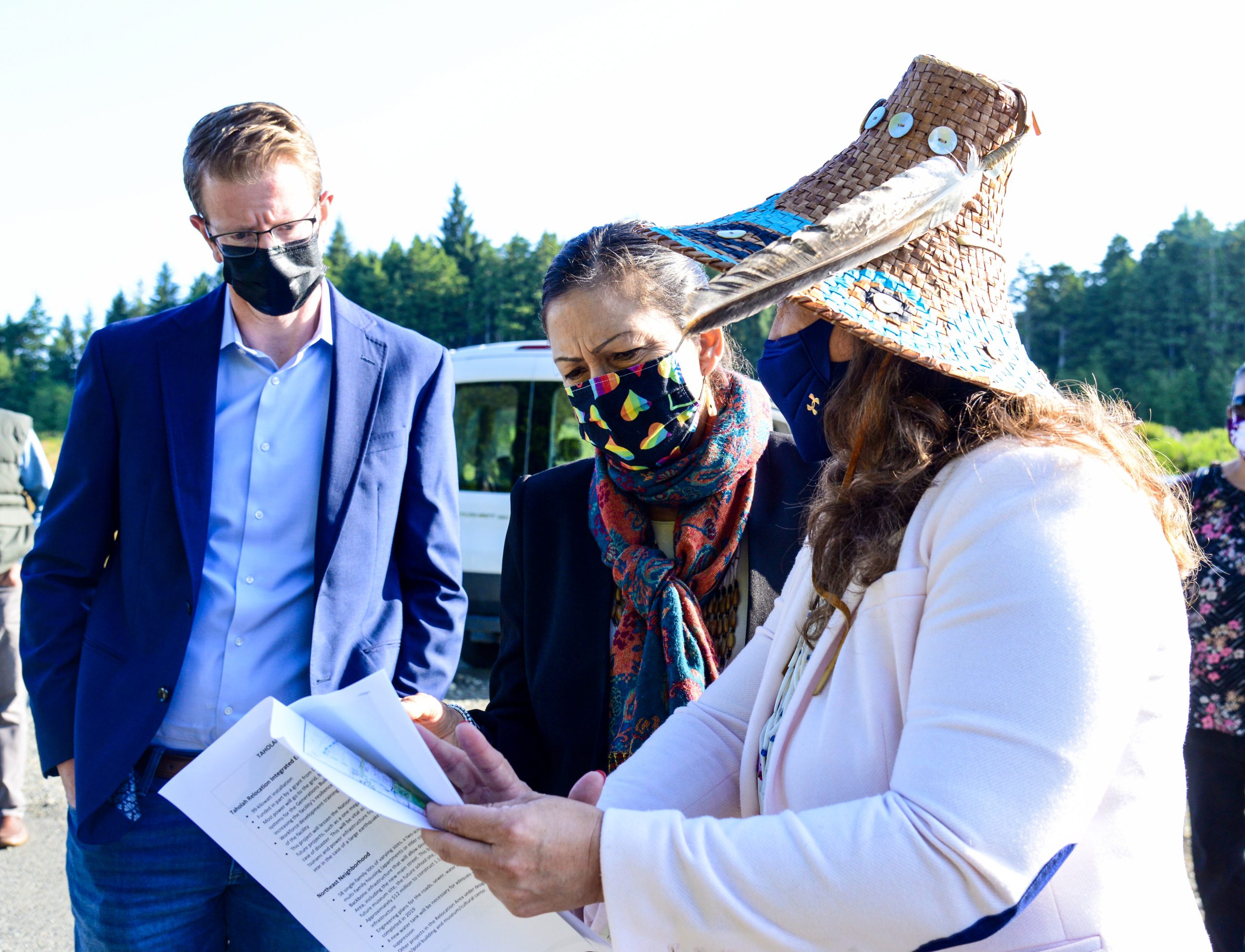Indianz.Com > News > Bipartisan Infrastructure Deal invests $736 million in Indian Country

Bipartisan Infrastructure Deal Makes Historic Investments in Tribal Infrastructure and Climate Resiliency
Legislation is the largest investment in the resilience of physical and natural systems in American history
Wednesday, November 10, 2021
The following is the text of a November 10, 2021, news release from the Department of the Interior.
WASHINGTON, D.C. — The Bipartisan Infrastructure Deal passed by Congress on November 5, 2021, makes historic investments in Indigenous communities’ efforts to tackle the climate crisis and boost resilience of physical and natural systems.
“As the effects of climate change continue to intensify, Indigenous communities are facing unique climate-related challenges that pose existential threats to Tribal economies, infrastructure, livelihoods, and health. Coastal communities are facing flooding, erosion, permafrost subsidence, sea level rise, and storm surges, while inland communities are facing worsening drought and extreme heat,” said Secretary Deb Haaland.
“The Bipartisan Infrastructure Deal’s historic investments in Tribal communities will help bolster community resilience, replace aging infrastructure, and provide support needed for climate-related relocation and adaptation,” said Secretary Haaland.
The Bipartisan Infrastructure Deal includes a $736 million investment for the Bureau of Indian Affairs (BIA), including for infrastructure projects and climate resiliency initiatives. The investments include:Climate change impacts every person on this planet, but not every person has access to lifesaving resources or the ability to relocate when disaster strikes. Entire communities and cultures are at risk of being lost to the perils of the climate crisis. pic.twitter.com/0vRFAW6by8
— Secretary Deb Haaland (@SecDebHaaland) November 8, 2021
• $270 million for BIA’s road maintenance program to improve the safety and condition of BIA-owned roads;
• $250 million for construction, repair, improvement and maintenance of irrigation and power systems, safety of dams, water sanitation and other facilities; and
• $216 million for Tribal climate resilience, adaptation and community relocation planning, design and implementation of projects which address the varying climate challenges facing Tribal communities across the country.
The infrastructure deal also includes a historic investment of $2.5 billion to help the Department fulfill settlements of Indian water rights claims and deliver long-promised water resources to Tribes, certainty to all their non-Indian neighbors, and a solid foundation for future economic development for entire communities dependent on common water resources in the face of climate change. With this transformational funding, the Interior Department will support collaborative and community-led planning, relocation expenses, infrastructure investments, and other forms of assistance to Tribal communities. The infrastructure deal’s investments would also advance our equity and environmental justice goals by helping safeguard vulnerable Tribal communities and making our economy fairer and more equitable. Secretary Haaland previously highlighted these investments in a trip to the Quinault Nation, as well as in a Seattle Times op-ed. As part of this broader commitment, the Interior Department also recently awarded nearly $14 million to dozens of American Indian and Alaska Native Tribal Nations and organizations to support their climate adaptation planning, ocean and coastal management planning, capacity building, and relocation, managed retreat, and protect-in-place planning for climate risks. This all-of-government approach is essential to supporting and empowering Tribal communities as they simultaneously face environmental impacts to physical, cultural, and subsistence-based infrastructure and relocate to higher ground.Millions of Americans live within one mile of thousands of abandoned mines. Thanks to the Bipartisan Infrastructure Deal, @Interior can support the working families—who often live in rural and Tribal communities—long after coal companies have moved on. https://t.co/3jqtF5Z6xU
— Secretary Deb Haaland (@SecDebHaaland) November 9, 2021
The Department of the Interior (DOI) conserves and manages the Nation’s natural resources and cultural heritage for the benefit and enjoyment of the American people, provides scientific and other information about natural resources and natural hazards to address societal challenges and create opportunities for the American people, and honors the Nation’s trust responsibilities or special commitments to American Indians, Alaska Natives, and affiliated island communities to help them prosper.
Search
Filed Under
Tags
More Headlines
Press Release: National Museum of the American Indian hosts Native art market
AUDIO: Sea Lion Predation in the Pacific Northwest
Native America Calling: Tribal colleges see an uncertain federal funding road ahead
Native America Calling: Short films taking on big stories
Native America Calling: Advocates push back against new obstacles to Missing and Murdered Indigenous Relatives momentum
Native America Calling: For all its promise, AI is a potential threat to culture
NAFOA: 5 Things You Need to Know this Week (November 24, 2025)
Chuck Hoskin: Cherokee Nation invests in rural transportation
Native America Calling: Native candidates make strides in local elections
National Congress of American Indians returns incumbents and welcomes newcomers to leadership
National Congress of American Indians chooses leadership at big convention
‘Not voting is still a vote’: Native turnout drops amid changes in political winds
Native America Calling: Indigenous voices speak up, but have little clout at COP30
‘It’s bull****’: Indian Country confronts challenges at largest inter-tribal conference
Native America Calling: The constant burden on tribal hunters to justify their treaty rights
More Headlines
AUDIO: Sea Lion Predation in the Pacific Northwest
Native America Calling: Tribal colleges see an uncertain federal funding road ahead
Native America Calling: Short films taking on big stories
Native America Calling: Advocates push back against new obstacles to Missing and Murdered Indigenous Relatives momentum
Native America Calling: For all its promise, AI is a potential threat to culture
NAFOA: 5 Things You Need to Know this Week (November 24, 2025)
Chuck Hoskin: Cherokee Nation invests in rural transportation
Native America Calling: Native candidates make strides in local elections
National Congress of American Indians returns incumbents and welcomes newcomers to leadership
National Congress of American Indians chooses leadership at big convention
‘Not voting is still a vote’: Native turnout drops amid changes in political winds
Native America Calling: Indigenous voices speak up, but have little clout at COP30
‘It’s bull****’: Indian Country confronts challenges at largest inter-tribal conference
Native America Calling: The constant burden on tribal hunters to justify their treaty rights
More Headlines